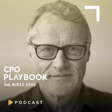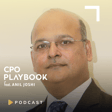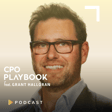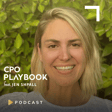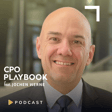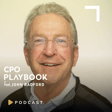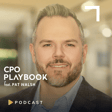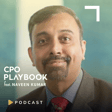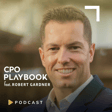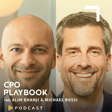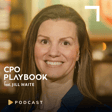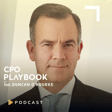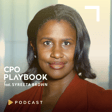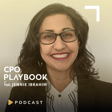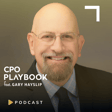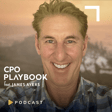Introduction to CPO Playbook Podcast
00:00:04
Speaker
Hello everyone, I'm Felicia Shakiba, and you're listening to the CPO Playbook Podcast. Join me and my guests as we feature insightful conversations with HR leaders, people scientists, and executives from diverse industries and functions, offering valuable perspectives on the future of work.
00:00:23
Speaker
Discover a unique outlook on navigating the complexities of the modern-day working world, exploring innovative strategies in talent management and corporate culture from the chief people officer's perspective. Tune in to stay ahead of the game when it comes to all things people related.
Challenges in Africa's Electrification
00:00:44
Speaker
According to Seifedin Galal, a research expert for Statista, Africa stands as one of the least electrified regions globally, with over half a billion people lacking access to electrical energy connections.
00:01:00
Speaker
In response to this challenge, entrepreneurship in Africa's renewable energy industry has emerged as a vital catalyst for change. In a captivating discussion with expert Stefan Lekem, we unveil the three essential skills for success in this sector. These skills include an entrepreneurial mindset,
00:01:20
Speaker
political astuteness and humility. Entrepreneurs must seize the opportunity, navigate the intricate political landscape, and maintain a sense of perspective and understanding of a foreign country. Join us on this enlightening journey as we explore how these skills drive the renewable energy revolution in Africa, fostering hope for a sustainable future across the continent.
00:01:49
Speaker
Stefan, thank you so much for being here. Welcome. Thank you very much, Felicia. I appreciate your interest in me. It's very exciting to chat with you today. So the first question I have for you is, could you share with us the story of how you embarked on your journey in the renewable energy industry in Africa?
Transition from Banking to Renewable Energy
00:02:09
Speaker
And what motivated you to pursue this path?
00:02:12
Speaker
Yes, it started in a different world by training. I am an investment banker and I developed investment funds through the years. And in the late 90s, for the first time, I went to Morocco.
00:02:31
Speaker
and met local people with whom I started to discuss potential investment opportunities which were outside of what I was doing at the time being. I was at the time developing, managing and selling investment funds.
00:02:47
Speaker
And for that I was traveling many countries, Africa being an area like others. But these business traveling in Africa made me meet local people who introduced me to the huge demand for
00:03:04
Speaker
infrastructure as a whole and energy specific core infrastructure needed for the development of the country are roads transportation and energy and many of these countries are craving for energy
00:03:18
Speaker
sometimes it's a bit of a paradox because some of them are producing oil and gas or energy commodities and don't even have the direct benefit of it for their own energy production. By that I mean that they are selling their resources to the outside world but still
00:03:40
Speaker
to not produce enough energy for their own electric grid. It did not start into renewable. For me, it was more gas producing power plant up to the moment, being aware of what's going on in the world and the absolutely necessary transition we have to go to. Me, like many African leaders, we realized that we should focus more on renewable. In the meantime,
00:04:09
Speaker
over the past 20 years, the technology has evolved a lot, which allows these investments to be more not only profitable, but type of renewable energy of high interest to them. This is how it all started. I am an investment banker, I'm traveling Africa,
00:04:28
Speaker
for investment solutions to be sold to local financial institutions. And then I realized on the ground that I could do something as an entrepreneur to accompany the development of energy production in these countries.
Navigating Politics and Corruption in Africa
00:04:44
Speaker
As a successful entrepreneur in the field, how have your politically savvy skills played a role in navigating the complex political landscape in Africa? Can you share an example of a situation where your political acumen was crucial to the success of a project?
00:05:03
Speaker
It's a very important point. It's a very good question because often it's all about it enough. It's finding the right local partners. And among those local partners, it's not only the economical and financial collaboration on the ground in the country, it's a lot of
00:05:21
Speaker
political and cultural relationship where what's happening is that those infrastructure investments are very important for the governments and political leaders to show their local action. You will be surprised how much we are being interrogated
00:05:39
Speaker
one year before any general elections, where political forces, local forces, want to show and demonstrate that they are active for their population and want things to change. So that relationship has to be very well established with the Ministry of Energy, with the Prime Minister office, the President's office, depending on the countries. We get into those negotiations with them.
00:06:05
Speaker
also has to be handled, very often there is some form of embedded corruption. What I mean by that is that local politicians want to know how they can benefit from an investment, so sometimes it's very direct, they want to receive some proceeds of an investment on which we are very firm, we're not going that direction, but some others it's more
00:06:30
Speaker
How can you support my next election? How can you contribute to my actions to the countries? And this is where we get into some form of a thorough conversation where we, for example, in Zimbabwe, we developed a school close to a small solar park we developed. And we were actually, it was a great experience. It was a beautiful local community school we developed for the local populations.
00:06:59
Speaker
and everyone was happy. We were, the local politicians were, and the community was, you know, that kind of very good collaborations where at the end of the day, positively you can help local political forces, which are very important for us and for the project developed, without falling into straight corruption and things we don't want to be engaged in. It's very important to find
00:07:24
Speaker
engage the conversations and find the way to provide services to these local forces, political forces, which are very important for the project to take place by supporting and helping them without falling to the dark side of the spectrum. And there this could not be done without time and without
00:07:48
Speaker
having a strong local political business partner, someone who is not only able to support the development of the project itself, but can handle the relationship with the government and with the public forces. And I spend a lot of time feeding the conversation with my local partners in the countries I am working to stay on top of the information.
00:08:17
Speaker
of what's going on and what are the trends, where the government wants to go, what are the changes.
Importance of Local Knowledge for Projects
00:08:25
Speaker
And for that you need to have someone on the ground talking to local administration, but also
00:08:30
Speaker
You get a lot of information by talking to local journalists, especially these days, you can have very easy access to local feeder of social media of importance in any of those countries. So all of that information, local information collection is very important to us for the kind of project we are developing, because again, it's not only
00:08:54
Speaker
an investment, it's an investment which serves public energy grids and local public developments. It sounds like data is significant. Can you share an example of when you collected data, whether it be from your local business partner or social media in Africa, that allows you to engage in conversation differently or take a different decision or path in order to complete a project?
00:09:21
Speaker
Well, it's sometimes understanding that the coming or next election will be a complete game changer. So sometimes your timing can be affected by information coming from on the ground. I can speak of Tanzania, where we were working on a specific dam at the border of Tanzania and Malawi.
00:09:43
Speaker
And then election came, a complete government reshuffle got us back to almost to ground zero, which was something we could anticipate and could prepare for a few months ahead because we got the local information. And in that process, we were able to get into the conversation with the opposition. They understood that this project was absolutely key for them too, because often in Africa, when an alternatives come,
00:10:13
Speaker
They basically erase everything. They are able to make some economic damages in terms of wanting to turn the page of a former government. And it's very important to get the conversation going with the opposition or people who will be the next generation, especially when you have started a project and you're engaged into studies and like we were in Tanzania.
00:10:39
Speaker
So you're saying that in order to anticipate changes, having those conversations early with people who might oppose the project or have resistance or challenges with it, we need to engage them early in order to figure out
00:10:54
Speaker
Which way to pivot exactly very important these days local interests sometimes it can be a community group which doesn't want to see the solar plant and a few hectares being occupied by solar panels to develop and there again you need to engage the conversations with those posing forces.
00:11:16
Speaker
to let them know and understand or at least try you do not succeed all the time but engaging the conversation with whatever forces you feel around the project you're developing is very important.
00:11:29
Speaker
I want to round this out because it's such an important piece. How does one effectively engage in a conversation with someone who holds an opposing opinion? And to sharpen your political astuteness, it becomes essential to contemplate whether or not it's possible to influence them to align with one's own perspective. How can this objective be accomplished in practice? It's a good question because
00:11:58
Speaker
It has a lot to do with listening first and appear as, especially as a white, occidental male I am. It's very important not to appear as arrogant in Africa because of the colonial pasts and lots of good reasons for people to question my legitimacy to be there and also often some patronizing
00:12:27
Speaker
tone I've heard from European, yet sometimes U.S.
00:12:32
Speaker
But most of the time, European organizations arriving in Africa with some form of patronizing behavior. We know the drill. We'll take you by the end and do not worry. We take care of everything and whatsoever. So that kind of tone, which I've heard a lot in Africa, is despised locally, basically. They are fed up. And the one first thing to be very important to understand is to show respect.
00:13:01
Speaker
and consideration. No, no, no arrogance, no patronizing. It's very important. Africa was before perhaps lacking human resources for many, many aspects of its development. I can assure you that it's not the case anymore. Younger generation of very well-trained, very smart people are now taking the hands of their country, their development. Certain countries are
00:13:31
Speaker
beautiful development examples and thinking of countries like Rwanda, Ghana, Kenya, Tanzania, where things are developing very, very well with younger generation of very smart people. And this is perhaps something I would get more to the end of our conversation, but I see some form of convergence where nowadays compared to 10 to 15 years ago,
00:13:58
Speaker
The way a renewable project develops in Africa tends to be more and more like it would be in Europe or in the US. Why? Because in the ministers, in the environment, I find
00:14:14
Speaker
very competent engineers who understand perfectly well how we will develop the project, how it happens to be. They also understand my needs. When you develop a solar park or solar plants, you need to be connected to the network. And sometimes in those huge African countries, the network for you to be connected to is very far away. So there is
00:14:36
Speaker
Collaboration to be established with the local utility to bring basically its wire up to your plant and all these conversation where before basically had to do all the job.
00:14:48
Speaker
Now we have people not only understanding, but are campaigning us and providing us with local, very smart and very good quality local resources. So Africa is changing and it's changing for the best. New generation not only is more competent, but it is also less prone to the easy cash flows of corruptions. I understand that by being a partner in a project, you
00:15:17
Speaker
make potentially more money than asking for a little something at the beginning just
Cultural Sensitivity in Business Practices
00:15:23
Speaker
to open you the door.
00:15:24
Speaker
And being politically savvy is just one critical skill set that's needed in order to get a project over the finish line. Then there's cultural sensitivity and a deep understanding of that environment, building relationships and collaborating. Those are all critical skill sets, it sounds like. Read about the local history before colonization. Lots have happened in Africa.
00:15:48
Speaker
I remember there was a French president some 10 or 15 years ago, Nicolas Sarkozy, and he's invited to Africa. At some stage, he said Africa has great potential and it's time for the African man to place himself in history. He said that during his presentation. That triggered fury all over Africa because an African man,
00:16:17
Speaker
will tell you where did human life and civilization start. It started in Africa. The Lucy, the million years remains of bodies. Lucy is the first female found in Ethiopia, which would be the oldest human in the world. And Africans would tell you the origins of humanity are coming from Africa.
00:16:41
Speaker
So don't try to explain us that we would be the young population to be educated. It's not the case. You Europeans, you are coming from where we are. You left us million years. So it's just to give you the mindset of an African, which is we're not the youngsters out of the wood. We were there way before you. We are very long.
00:17:08
Speaker
and very strong cultural background. The country's borders have been wrongly drafted by Occidental colonization. So understand the forces, the culture, and if you want to develop
00:17:25
Speaker
business in Africa, you have to be humble and understand the local culture, which is very interesting. There is lots of solidarity, there is lots of beautiful people and interests all over Africa, and this has to be respected. And my belief is that when a government, when whatever interest you're talking to in Africa, feel that in you that you respected their culture, their environment, where the door gets wide open, not many men.
00:17:55
Speaker
And I, I, well, I've been blessed. My team, my teams have been blessed by being more and more and totally interrogated by whatever subject these days. It's not only energy. It's many, many aspects. The other day we went to, to regated by Algerian people looking at developing a subjects. We would not be before even. Which are out of our expertise scope of business. We're now, because we have established those great relations, we have now being
00:18:25
Speaker
interrogating and having good conversations in many, many countries. So respect, listening and respect. To put together a project like this, how long did you say it takes? From scratch, depending on the country and its administration, let's take a standard 50 megawatt solar park. It would take me
00:18:48
Speaker
A year and a half in Morocco, it took me almost five years in Zimbabwe because you have to go through the authorization of the Ministry of Energy. Under the Ministry of Energy, you have the public agency which takes care of that.
00:19:03
Speaker
power production, then you have another agency taking care of the power distribution in a country not that well administratively organized like Zimbabwe takes a lot of time. You could accelerate that process by corruption and I never do that because if you start, in my opinion, you're down. One of the problems of corruption is that if you pay someone with the speed of the information in Africa in a country,
00:19:31
Speaker
If that information gets to be known, you get the whole country coming at you asking you for money. And it can be very, very detrimental, not only because it costs you money, of course, you have to pay the corrected party. But the problem is that if you don't pay and
00:19:51
Speaker
some interest known that you've paid some others. Then comes the people who find interest in blocking your project and kind of trying to find leverage on blocking you. So instead of if you're known not to pay, it might go slower. It might be more complicated, but the chances you would be fully blocked are much, much lower. And that's also something I learned in Africa. So I prefer to spend the time
00:20:20
Speaker
do the things by the book and not being drafted in a vortex of corruption and people coming from nowhere asking you for whatever. It's important to stay firm.
00:20:31
Speaker
In such a leadership role or any similar position, it's reasonable to anticipate that individuals might face difficulties if their ethical principles were to undergo even a slight wavering. Even independent from the ethics, even business-wise, it's a bad choice. On the long term, I mean, to stay in the business and go to other projects or whatsoever. If it is a one-shot project, then it's up to you. I would not even recommend it.
00:20:58
Speaker
That makes a lot of sense. Yeah. And even if you want to be cynical, that happened to US interests, you know, where you get some form of the Texan cowboy arriving in Africa.
00:21:13
Speaker
I'm making it a bit of a caricature, of course, for the sake of my demonstration. I love Texans. I love to be doing business with Texans. They're very straightforward and for business ways, they're great. But sometimes you hear about, especially in the oil and gas industry, the Texan guy arrives in Angola and
00:21:33
Speaker
And he sits down and how much do you want? What would it cost me? Whom do I need to pay? And whatsoever, I want that to happen right away, right now. And we move forward. It doesn't work. First, it will cost him a lot. And then again, as I was saying, the information that he has been paying will be known and then will raise the forces, will blow against his own project. It's expensive and unpredictable.
00:22:02
Speaker
Is there anything that we haven't talked about that you want to make sure to share with our listeners today? Your questions were very accurate and thank you. I think you understood the challenges of developing business in a different world. And I think Africa, like any other place, you need to understand your environment and you do that for any places. It's a great.
00:22:27
Speaker
part of the world. It's a changing part of the world. It's extremely exciting to see how these places are developing.
Stefan Lukam's Professional Background
00:22:35
Speaker
That might be my conclusion. Stefan, this has been enlightening. Thank you so much. My pleasure.
00:22:42
Speaker
That's Stefan Lukam. With a postgraduate degree in business and managerial economics from Harvard University, Lukam is the president of Logoden Advising and a distinguished figure in the realm of renewable energy entrepreneurship in Africa.
00:23:05
Speaker
If you like today's podcast, we have more podcasts on innovative HR strategies, talent management, organizational culture, and more, and how to navigate the complexities of modern day HR.
Podcast Engagement and Submissions
00:23:18
Speaker
Find them at CPOplaybook.com slash podcasts or search CPO Playbook on Apple podcasts, Spotify, or wherever you listen. Thanks for listening to the CPO Playbook podcast. We'll be back with a new episode next time.
00:23:36
Speaker
I'm Felicia Shakiba.
00:23:39
Speaker
If you love CPO Playbook, the best thing you can do to support us is become a subscriber. You can do that at CPOplaybook.com slash podcast. That's CPOplaybook.com slash podcast. If there's an episode you loved, please share it with a friend. And if you have an idea you would like us to talk about or a guest you'd like to nominate, visit CPOplaybook.com slash contact us to suggest an idea.

